Past Events
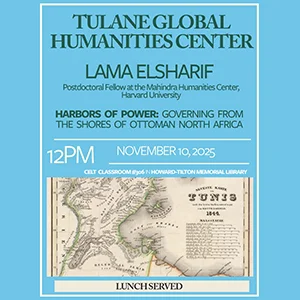
Dr. Lama Elsharif, Postdoctoral Fellow at Mahindra Humanities Center, Harvard University
Monday, November 10, 12 pm
CELT Room #306 in Howard-Tilton Memorial Library
Dr. Lama Elsharif will present a talk that examines how the port city of Tunis under Ḥammūda Pasha, bey of Tunis (1782-1814) functioned as a center of governance. Rather than examining North Africa’s port cities through fragmented lenses that cast them either as quarantine stations, corsairing bases, commercial gateways, or cosmopolitan crossroads, this talk brings these dimensions into a single frame to show how they collectively shaped political authority in Tunis. A key port city in the early modern Mediterranean, Tunis was both a harbor of power and a point of vulnerability, strategic for diplomacy and trade yet exposed to wars, epidemics, and scarcity. Dr. Elsharif argues that the convergence of these pressures transformed Tunis into a laboratory of governance, where coastal life and imperial politics intersected and where rulers defined and tested power at the water’s edge.
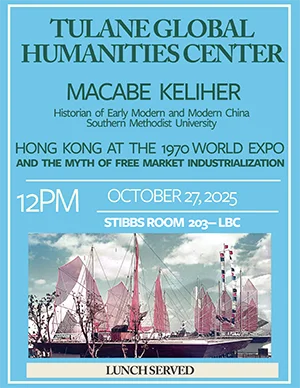
Dr. Macabe Keliher, Professor of History at Southern Methodist University. “Constructing the Laissez-Faire Narrative of Industrialization: Hong Kong at the 1970 World Expo”
Monday, October 27, 12 pm
Stibbs Room in LBC
Macabe Keliher, Professor at Southern Methodist University, will present, “Hong Kong at the 1970 World Expo and the Myth of Free Market Industrialization.” Dr. Keliher explores how the Hong Kong pavilion at the 1970 World Exposition in Osaka presented a narrative of free trade and laissez-faire economics that came to impact all subsequent interpretations of economic development right up to the present day. He argues that this narrative was a particular interpretation of Hong Kong’s development and contrary to existing understandings, it was not natural but rather actively constructed in response to an unstable international context that threatened economic development.
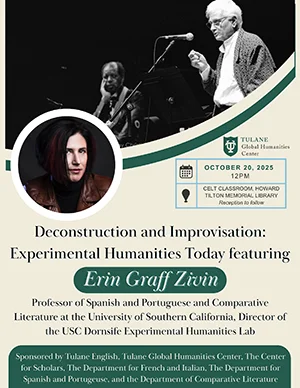
Dr. Erin Graff Zivin, Director of the University of Southern California Dornsife Experimental Humanities Lab “Deconstruction and Improvisation: Experimental Humanities Today”
Monday, October 20, 12 pm
Location: Kendall Cram Hall, LBC
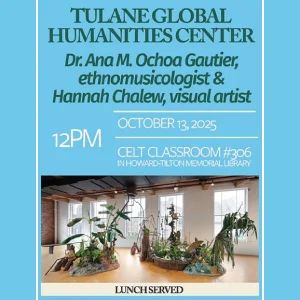
Dr. Ana M. Ochoa Gautier, Tulane Professor of Ethnomusicology and Hannah Chalew, Visual Artist
Monday, October 13, 12 pm
CELT Room #306 in Howard-Tilton Memorial Library
Dr. Ana M. Ochoa Gautier, Tulane professor and ethnomusicologist, & Hannah Chalew, visual artist, will present a short talk on their research and then have a conversation around the shared themes on extraction, aurality, arts, and port cities found in their work.
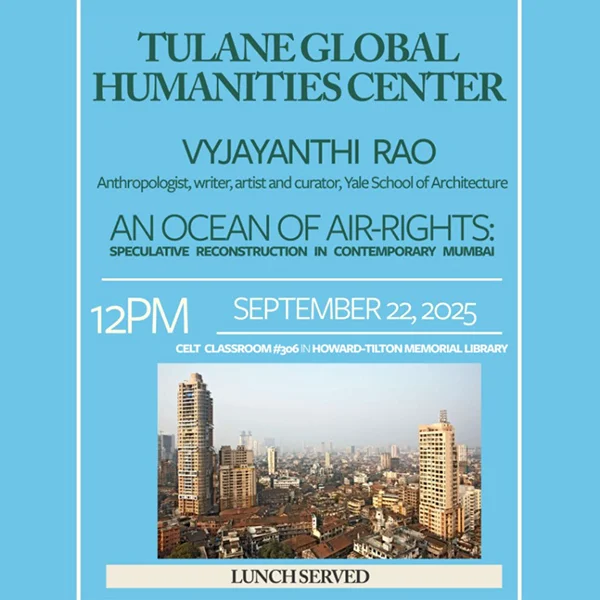
An Ocean of Air-Rights: Speculative Reconstruction in Contemporary Mumbai with Vyjayanthi V. Rao
September 22, 12 pm
Howard-Tilton Memorial Library, Room 306
This talk contrasts and explores two exemplary moments in the growth and urban development of the colonial port city of Bombay from the 19th century to its present avatar as Mumbai, a center of global speculative capital. Connecting the colonial opium trade to the city’s morphology and physiognomy, we explore the contemporary effort to redevelop Mumbai through the planning instrument of air rights and the forms of collective urban life that might be produced in its wake.
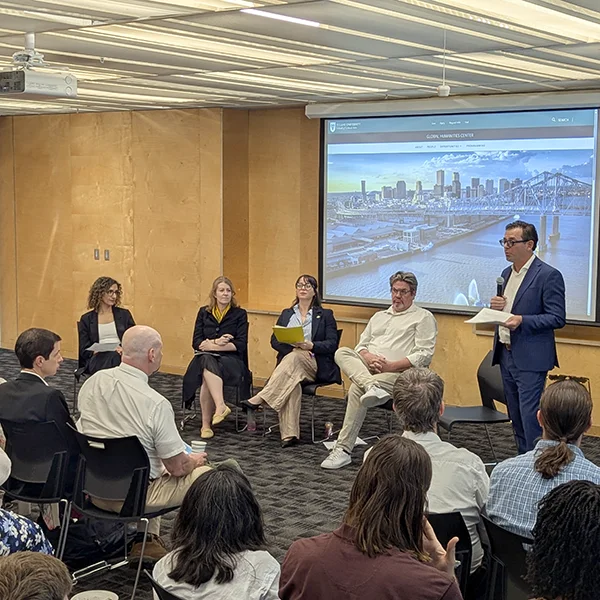
“Tulane Global Humanities Center: The Launch”
September 8–12 pm
Stibbs Room in Lavin-Bernick Center
Panelists: Chris Dunn, Edwige Tamalet Talbayev, Maryam Athari, Tori Bush
Moderator: Brian Edwards
This opening panel discussion of the Tulane Global Humanities Center explores the center's biennial theme of Global Port Cities.

